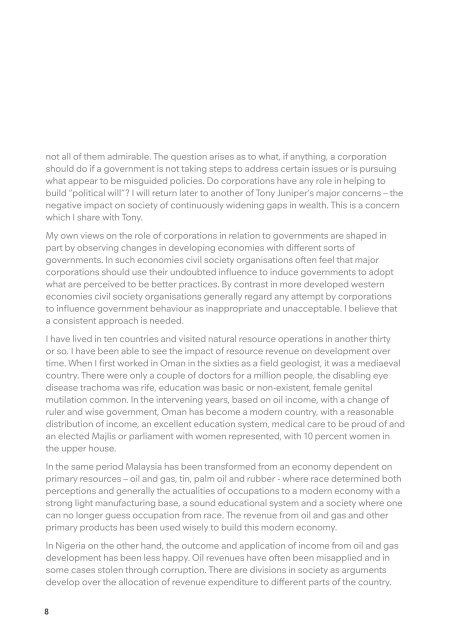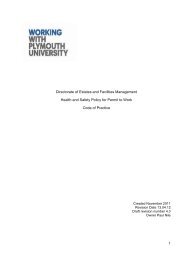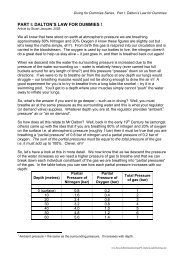Download a .pdf of Sir Mark Moody Stuart's full Beyond ... - Plymouth
Download a .pdf of Sir Mark Moody Stuart's full Beyond ... - Plymouth
Download a .pdf of Sir Mark Moody Stuart's full Beyond ... - Plymouth
Create successful ePaper yourself
Turn your PDF publications into a flip-book with our unique Google optimized e-Paper software.
not all <strong>of</strong> them admirable. The question arises as to what, if anything, a corporationshould do if a government is not taking steps to address certain issues or is pursuingwhat appear to be misguided policies. Do corporations have any role in helping tobuild “political will”? I will return later to another <strong>of</strong> Tony Juniper’s major concerns – thenegative impact on society <strong>of</strong> continuously widening gaps in wealth. This is a concernwhich I share with Tony.My own views on the role <strong>of</strong> corporations in relation to governments are shaped inpart by observing changes in developing economies with different sorts <strong>of</strong>governments. In such economies civil society organisations <strong>of</strong>ten feel that majorcorporations should use their undoubted influence to induce governments to adoptwhat are perceived to be better practices. By contrast in more developed westerneconomies civil society organisations generally regard any attempt by corporationsto influence government behaviour as inappropriate and unacceptable. I believe thata consistent approach is needed.I have lived in ten countries and visited natural resource operations in another thirtyor so. I have been able to see the impact <strong>of</strong> resource revenue on development overtime. When I first worked in Oman in the sixties as a field geologist, it was a mediaevalcountry. There were only a couple <strong>of</strong> doctors for a million people, the disabling eyedisease trachoma was rife, education was basic or non-existent, female genitalmutilation common. In the intervening years, based on oil income, with a change <strong>of</strong>ruler and wise government, Oman has become a modern country, with a reasonabledistribution <strong>of</strong> income, an excellent education system, medical care to be proud <strong>of</strong> andan elected Majlis or parliament with women represented, with 10 percent women inthe upper house.In the same period Malaysia has been transformed from an economy dependent onprimary resources – oil and gas, tin, palm oil and rubber - where race determined bothperceptions and generally the actualities <strong>of</strong> occupations to a modern economy with astrong light manufacturing base, a sound educational system and a society where onecan no longer guess occupation from race. The revenue from oil and gas and otherprimary products has been used wisely to build this modern economy.In Nigeria on the other hand, the outcome and application <strong>of</strong> income from oil and gasdevelopment has been less happy. Oil revenues have <strong>of</strong>ten been misapplied and insome cases stolen through corruption. There are divisions in society as argumentsdevelop over the allocation <strong>of</strong> revenue expenditure to different parts <strong>of</strong> the country.What has caused these different outcomes? In each case, the main oil companywas the same, operating with similar people and to similar principles. The actions <strong>of</strong>companies, both positive and negative, undoubtedly had some impact, but the realdifference has come from the characters and motivations <strong>of</strong> the government leadersinvolved. Oman and Malaysia have been blessed with leaders with very clear visionsand commitment to development, providing frameworks within which business andcivil society operate. You might not agree with the political system in either case, butthere is no denying the results. Nigeria on the other hand has suffered from frequentchanges <strong>of</strong> leadership, normally by military coup, with leaders whose agendas have<strong>of</strong>ten been more personal than national. The present democratic government ismaking some progress in the battle to establish sound and uncorrupt governancesystems, but it is a tough battle and the corrupt funds available to opponents <strong>of</strong>change are large.But government alone is not enough – different parts <strong>of</strong> society need to co-operate.In Malaysia, perhaps as a result <strong>of</strong> staring into the abyss <strong>of</strong> racial slaughter in 1969,different ethnic groups have developed working compromises. In Oman, it has beenpossible to build on strong social and religious structures. In Nigeria, the creativity andenergy <strong>of</strong> civil society is evident in the way that in response to a severe deterioration <strong>of</strong>the education system, people have got together to start their own schools. Religiousinstitutions are strong and family cohesion and support systems are something whichwould benefit this country. Yet without a government framework providing basicstructure services, much creativity has gone in less socially constructive directions.You do not know how dependent society is on government until you experience thelack <strong>of</strong> it.What are the limits to corporate influence on governments?If effective government and functioning civil society are essential components <strong>of</strong>development, what <strong>of</strong> corporations? What are the limits <strong>of</strong> their role? When I joinedShell in the sixties, the involvement <strong>of</strong> ITT in developing country politics was an issueand the activities <strong>of</strong> United Fruit had given rise to the epithet “banana republic”.Corporate concerns were to avoid involvement in political activity in any form. In theseventies, I and many <strong>of</strong> my colleagues believed that if a company ran an efficientoperation with sound staff development, employment, safety and environmentalpolicies, did not bribe anyone, paid our taxes honestly and in the country whereincome was earned and engaged in a reasonable amount <strong>of</strong> community development,our responsibilities stopped there. The Economist newspaper still holds this line,8 9
















